Recycled Pavement Materials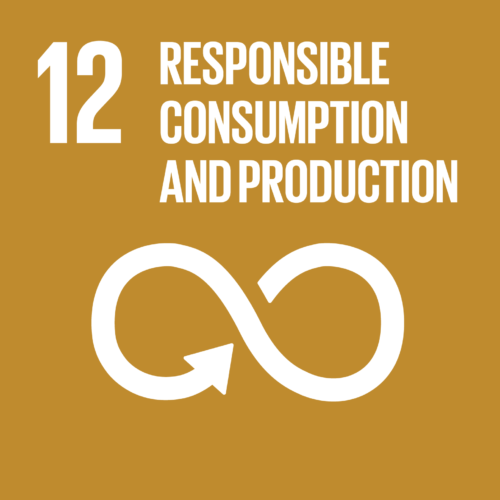
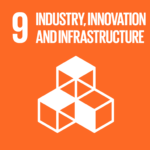
for Sustainable Management of Local Asphalt Resources
A sphalt recycling technology (hereinafter called “the Technology”) is a method to repair roads at lower cost and with lower environmental impact than conventional methods. The technology can reduce the use of new pavement materials by recycling reclaimed asphalt pavement (hereinafter called the "RAP") which is generated when roads are repaired, for producing recycled asphalt mixtures and using those mixtures again to pave roads.
In Indonesia, we have established the technology for producing recycled asphalt mixtures with the recycle rate (i.e. rate of recycled RAP as pavement materials) of 40% and 50%. We set up a local subsidiary and constructed an asphalt recycling plant in Karawang, West Java Province jointly with a local road construction company in 2017 and expanded our asphalt recycling business in Indonesia in a full-fledged manner.
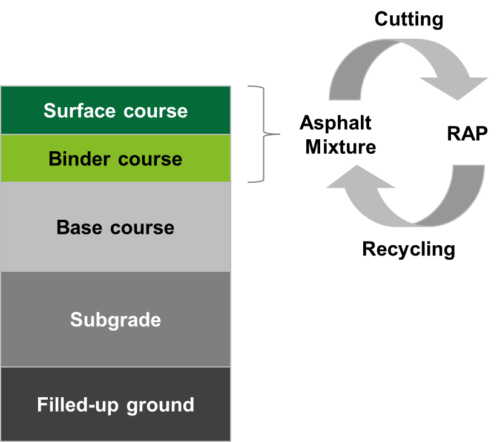 Fig. 1 Composition of asphalt pavement
Fig. 1 Composition of asphalt pavement
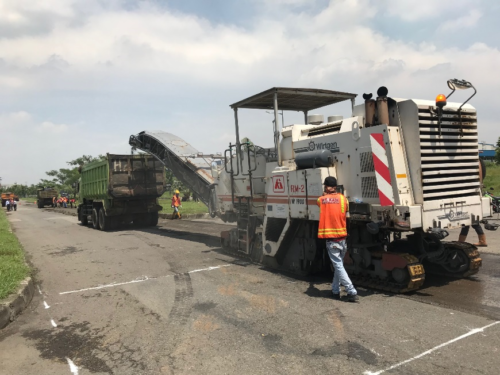 Fig. 2 Asphalt milling machine
Fig. 2 Asphalt milling machine
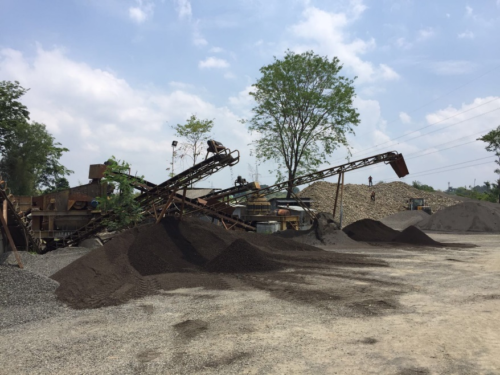 Fig. 3 Reclaimed Asphalt Pavement (RAP)
Fig. 3 Reclaimed Asphalt Pavement (RAP)
Major Features and Advantages
1. Promotion of resource recycling
In developing countries such as Indonesia, degraded or damaged roads are generally repaired by paving a new asphalt layer on them. This method is called “overlay”. Once asphalt mixtures are paved by overlay method, the paved asphalt mixtures will not be utilized as materials again.
On the other hand, we can efficiently use finite resources such as asphalt, by using asphalt recycling technology. In this technology, we cut and remove the degraded or damaged pavement, produce recycled asphalt mixtures by using RAP, and pave them on roads again.
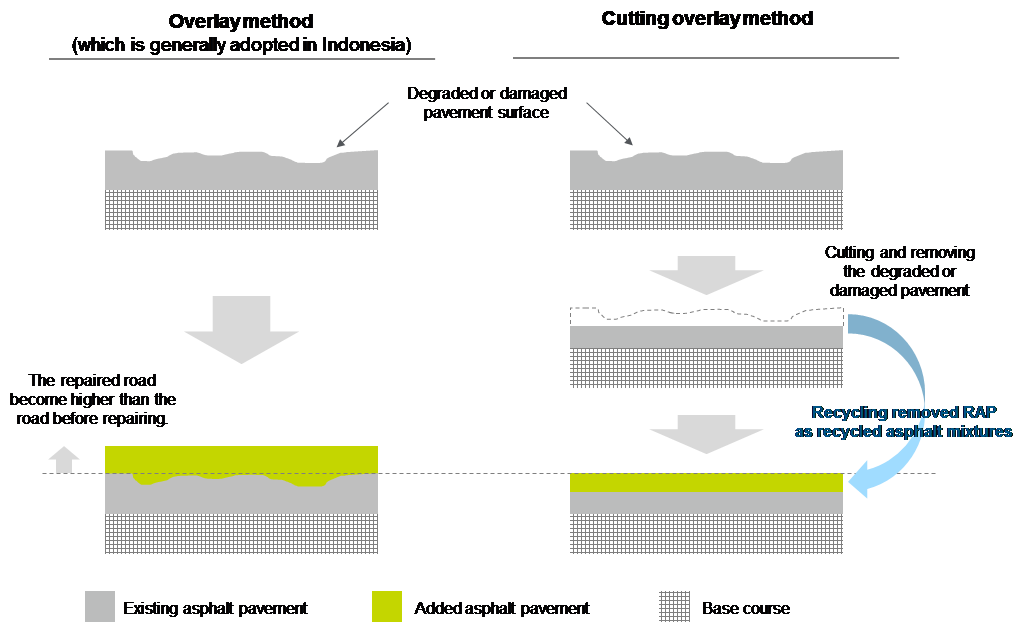 Fig. 4 Comparison between “cutting overlay method” and “overlay method”
Fig. 4 Comparison between “cutting overlay method” and “overlay method”
2. Cost reduction
Recycling RAP as pavement materials can reduce the use of new pavement materials (e.g. aggregate, bitumen). In developing countries such as Indonesia, the overlay method tends to be selected to repair roads. in which asphalt mixtures produced from new pavement materials are used, The Technology can reduce costs by approximately 5%, compared to the conventional method, taking into account the life cycle from cutting degraded roads, crushing RAP, and producing recycled asphalt mixtures to paving roads.
3. Lower environment impact
Recycled RAP can reduce the use of new pavement materials such as aggregate and bitumen, thereby reducing CO2 emissions from the production and transportation of those materials. For example, bitumen, derived from fossil resources, can be obtained by refining petroleum and emits a huge amount of CO2, a by-product of the refining process. Asphalt recycling can reduce the use of straight asphalt, of which CO2 emission intensity is high, therefore contribute to lowering CO2 emissions.
4. Improved quality of pavement
The overlay method creates steps between repaired parts and unrepaired parts since the height of the repaired road becomes higher than others. In some cases, this method could not be a fundamental countermeasure, because there remains degraded or damaged pavement in the repaired road. On the other hand, by cutting and removing degraded or damaged parts prior to paving roads, the Technology provides the even surface road without any steps which makes it possible for the paved road to deliver inherent performance.
Technology Data
Possible applications
The technology adopts a method in which asphalt mixtures are paved to roads whose degraded or damaged pavement have been removed when roads are repaired. This reclaimed asphalt pavement, the RAP, will be recycled for producing recycled asphalt mixtures to be used again to pave roads. More specifically, recycled asphalt mixtures can be produced by heating recycled aggregate, produced through the cutting and grading of grains of RAP, and adjusting and mixing with new pavement materials (e.g. aggregate, bitumen, additives) to match the quality and performance standards of the road pavement.
The asphalt recycling technology is widely used in Japan, the U.S., and Europe. In Asia, Singapore has already implemented the Technology. Even in developing countries where asphalt recycling is not adopted, this is considered to be possible by establishing the design mix formula that meets local standards through laboratory-scale tests using local RAP, etc. By implementing asphalt recycling, road repair costs and CO2 emissions are expected to be reduced.
Competitive advantage
The asphalt recycling technology can reduce road repairing costs and CO2 emission compared to the conventional road repairing method (asphalt mixtures produced from new pavement materials + the overlay method), meeting local quality and performance requirements for asphalt paving. Costs are expected to be cut by 5% and the CO2 emission reduction to be approximately 7kg-CO2/ton-asphalt, although the effect varies depending on the RAP transportation distance.
Performance
The quality and performance standards for asphalt paving are specified by each country, therefore it is necessary to establish a design mix formula for producing recycled asphalt mixtures that meet local quality and performance standards. In Indonesia, with the help of local research institutions and road construction companies, we have established the design mix formula for asphalt mixtures for surface and base layers with the recycle rate of 40% and 50%. Below is an example of a performance test result of recycled asphalt mixtures for surface layers with the recycle rate of 40%.
Table1 Example of asphalt mixture’s performance in Indonesia (Recycle rate of 40%)

Technical maturity / Past record of introduction
A few years ago, we started working with Indonesian universities and research institutions to consider optimal design mix formula for producing recycled asphalt mixtures from local pavement materials in Indonesia (e.g. considering the composition rate of recycled RAP and new pavement materials). In addition, we paved recycled asphalt mixtures to public roads on trial to verify the performance and quality of them. As a result, we were able to establish the design mix formula for producing recycled asphalt mixtures for surface and base layers with the recycle rate (i.e. the rate of recycled materials) of 40% and 50%, and we are now in the process of commercializing the production technology we have established.
Also, we have conducted the Feasibility Survey for the Pavement Recycling Technology with Asphalt Waste, as part of measures to support overseas expansion of SMEs undertaken by JICA, between April 2017 and June 2018.
JICA Feasibility Survey Report
We constructed an asphalt recycling plant in Karawang, West Java Province, Indonesia and have a track record of selling recycled asphalt mixtures mainly for paving roads to private premises such as industrial parks.
Information on patent related to this technology
N/A
Company Data
| Name | Sugawara Industry Co., Ltd. |
| Address |
132, akaiwamukaemaeda, Kesennuma city, Miyagi, 988-0163, Japan |
| Capital |
20 million JPY (as of 1st October, 2019) |
| Contact person |
Mr. Wataru SUGAWARA |
| Number of employees | 35 (as of 1st October, 2019) |
| Date of company foundation | 1st July, 1980 |
| The type of business |
Construction work: civil engineering, paving, piping, water supply facility, etc. |
International operation
| Number of employees for international operation |
2: One employee is stationed on a long-term business trip basis and another employee can be transferred on a short-term business trip as necessary. |
|
| Overseas offices |
City, Country | Name of Company (if applicable) |
| Karawang, West Java Province, Indonesia | PT. Sugawara Kadi Indonesia | |
Modality of business transaction
Direct Ivestment
We established a joint venture company, named PT. Sugawara Kadi Indonesia, with a local road construction company in February 2017, and constructed an asphalt recycling plant in Karawang, West Java Province, operated jointly by KADII and SKI, in an effort to build a sustainable asphalt recycling system. We are considering constructing our second asphalt recycling plant in order to expand our asphalt recycling business further in Indonesia.
Attachments
Schematic illustration of the technology
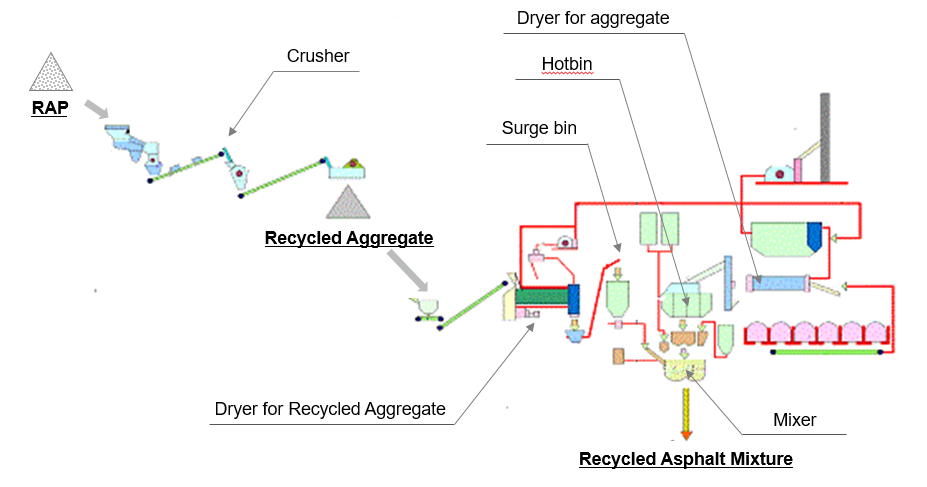 Fig. 5 General of scheme of RAP recycling plant
Fig. 5 General of scheme of RAP recycling plant
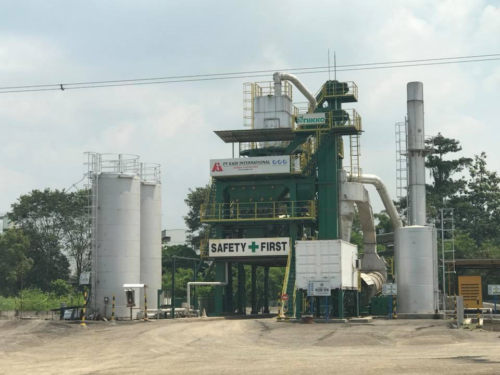 Fig. 6 RAP recycling plant in Indonesia
Fig. 6 RAP recycling plant in Indonesia
Corporate website (written in Japanese): http://sugawarakogyo.co.jp/about/
Contact Person(s)
*Please mention that you saw UNIDO's website when making the first contact with the company.
Registered Category
- Environmental Technologies : Waste treatment and management / Circular Economy (3R)

